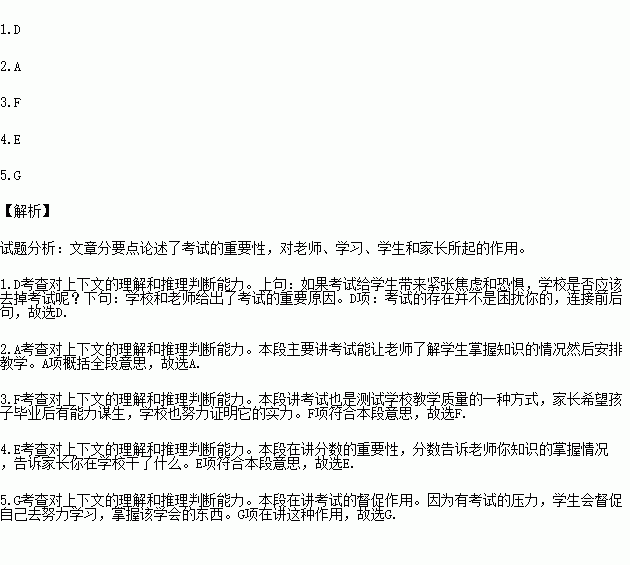题目内容
根据短文内容,从短文后的选项中选出能填入空白处的最佳选项,选项中有两项为多余选项。
If tests can make students nervous, anxious and even scared, shouldn’t schools just get rid of them? 1. Teachers and schools give students tests for very important reasons:
2. Giving a test is a way for a teacher to see which students are learning the skills and knowledge they should be learning, and which ones are having trouble. Depending on how kids do on the test, the teacher will know if he or she must go back over some things, or if it’s okay to keep moving forward。
To see how well your school is teaching you. All parents want their kids to finally graduate with the ability to earn a living. 3. And one way to do this is to have them take test.
To assign (指定) grades. 4. Besides your homework, tests are one of the best ways for you to show the teacher that you’ve really learned what’s being taught, and for the teacher to figure out what grade you should get. Grades are also a way to show your parents how you’re doing in school.
To keep you motivated(有积极性的). Admit it: you work harder if you know someone is checking up on your work. For example, if your mom tells you to clean your room but you know she will never go in and check, then you might not do it, right? 5. Because you know that you’ll eventually have to take a test on the material and you might be more likely to give it that extra effort and make sure you know everything you’re supposed to know.
A. To see if you’re learning.
B. To see if you are totally prepared.
C. Students must work hard to get good grades.
D. Well, believe it or not, tests don’t just exist to trouble you.
E. Grades are important in most schools, and tests play a big role.
F. So schools have to prove they’re trying their best to educate students.
G. Well, tests help make sure that you don’t leave your homework behind.


